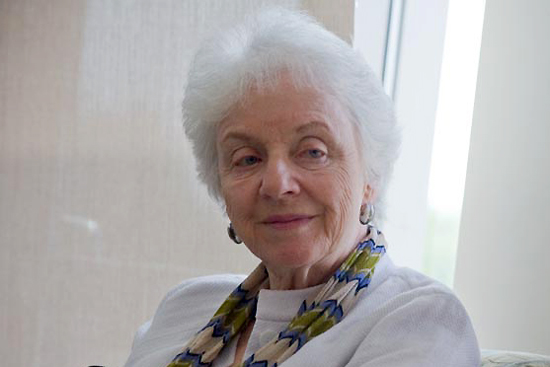Madeleine Kunin’s Inside Take on Women in Politics
Former Vermont governor explores gender and public service

From a six-year-old refugee fleeing the Nazis to Vermont’s first woman governor to an ambassadorship, Madeleine Kunin’s life arc has crossed oceans and history. She will share lessons learned this afternoon at the Photonics Center in a talk titled An Insider’s Look at the Role of Women in Politics.
Kunin’s mother led her Jewish family out of Switzerland in 1940 in advance of a feared German invasion; Kunin’s father, who suffered from depression, drowned himself before they fled, and relatives who stayed behind in Europe died in concentration camps. The family reached the United States, where Kunin was educated at the University of Massachusetts, Columbia University, and the University of Vermont. Spurred by the Holocaust to enter politics as an arena for righting wrongs, Democrat Kunin was elected a Vermont state representative in 1972, lieutenant governor in 1978, and governor for the first of three terms in 1984.
She later served in the Clinton administration as deputy secretary of education and as ambassador to Switzerland and Liechtenstein, where she prodded recalcitrant Swiss bankers to release records of wartime accounts so heirs of victims could file claims. She was stunned to find her mother’s name on the list.
Kunin is now a visiting professor of political science at the University of Vermont. She is married to John Hennessey, dean emeritus of Dartmouth’s Tuck School of Business Administration.
BU Today: Your talk promises “an insider’s look” at women in politics. What’s on the inside that the public doesn’t see?
Kunin: The bad news is that there really is a small percentage of women in the political system at all levels. The U.S. Congress is 17 percent women.
The United States ranks 72nd among 183 countries in the percentage of women officeholders. Iraq and Afghanistan are ahead of us. American women still tend to underestimate themselves.
The good news is that once women get there, they make a difference. Women tend to be more supportive of education, health care, and the environment.
So it’s not a glass ceiling?
No, there is no gender bias in most politics. In addition to underestimating their qualifications, research shows women need to be asked to run more than men.
Did you feel you were criticized in a way a male leader wouldn’t have been?
Every time there’s a first, there’s a glaring spotlight put on you. In my case, there was an unspoken question: was I tough enough?
What about a glass ceiling in academia?
There was an article about women in science that said while women have made great progress, it is not proportional to the Ph.D.s granted. All of us, including women, are influenced by gender bias. When papers are written with a female name on them, they’re graded differently. Women have to have more papers in the pipeline to get promoted. But we’re making progress; I don’t want to sound pessimistic.
Your book Pearls, Politics & Power is subtitled How Women Can Win and Lead. Can you give us the CliffsNotes version?
Many women have the credentials to run for office, if they have the network. Health and Human Services Secretary Kathleen Sebelius gave me a quote: “Any woman who can organize a birthday party for a five-year-old can run a campaign.” Women still are not involved in many of the smoke-filled rooms, so they have to build their own networks, both in terms of campaign funds and emotionally, helping cope with politics-family tensions. Running for office is not rocket science.
Much has been made of so-called men’s issues vs. women’s issues. Don’t men also have to worry about things like day care availability and education?
That’s my next book, writing about family-work issues. You have people like U.S. Senator Christopher Dodd (D-Conn.), who has been a strong advocate for these issues. But usually women have taken the lead, because they’ve lived with these problems.
You remarried at age 71, joking that it was a mixed marriage blending Vermont and New Hampshire. How has that worked out?
Beautifully. I have to confess we spend more time in Vermont.
Madeleine Kunin’s lecture, An Insider’s Look at the Role of Women in Politics, begins at 4 p.m. today, March 31, at the Photonics Center Colloquium Room, ninth floor, 8 St. Mary’s St. A reception and signing of her 2008 book, Pearls, Politics & Power: How Women Can Win and Lead, will follow. Admission is free and open to the public; seating is first-come, first-served. The talk is sponsored by BU’s Women in Science and Engineering and the Women’s Studies Program.
Rich Barlow can be reached at barlowr@bu.edu.

Comments & Discussion
Boston University moderates comments to facilitate an informed, substantive, civil conversation. Abusive, profane, self-promotional, misleading, incoherent or off-topic comments will be rejected. Moderators are staffed during regular business hours (EST) and can only accept comments written in English. Statistics or facts must include a citation or a link to the citation.